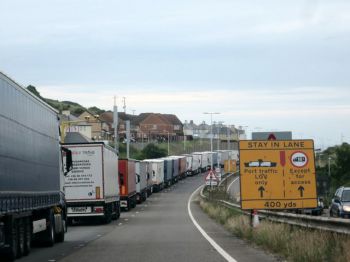Councils advised to set up ‘food resilience teams’ to prepare for Brexit
By:
Last updated: Friday, 30 November 2018

Food policy experts are advising councils to prepare for the impact of Brexit on food supplies including the risk of major delays at ports.
Local authorities should set up “food resilience teams” to prepare for different Brexit scenarios, according to an advice notice written by food policy experts.
The document – from specialists at City, University of London, University of Sussex and the Chartered Institute of Environmental Health (CIEH) – has been sent to every council in the United Kingdom, and will be available online.
It suggests authorities should consider creating the food resilience teams to make risk assessments of how different outcomes of Brexit might affect food provision and supply in their local areas.
The briefing, which is the latest in the Food Brexit Briefing series from the Food Research Collaboration, advises that councils will have a role to play as the local voice and ears to help limit the risk of social disorder, which has been brought on by food supply problems in the past.
There is wide agreement within local authorities that some level of preparation for food supply after Brexit is both possible and sensible, according to the document.
The advice notice suggests food resilience teams should:
• Map existing food systems in their regions
• Conduct rapid assessments of where risks and potential disruptions lie
• Clarify the limits to stockpiling
• Bring together relevant professionals and expertise
• Be prepared to convey this information to the Government and public.
The notice highlights local authorities’ responsibility for the enforcement of food safety and standards regulation, with a scope ranging from school meals to imported and exported products.
However, it says the Government’s guidance notes for a no-deal Brexit are “welcome but inadequate” and warns that local authorities have not been given enough advice.
According to the notice, every form of Brexit will affect the food system in some way, particularly a no-deal scenario.
Several food risks are highlighted, including: price changes, reduced food availability, lower standards and safety, supply disruption, border delays, freight logistics and public disorder.
The food resilience teams should combine expertise from both within the authority (such environmental health officers, trading standards officers, planners, food emergency planning bodies) and other experts, including NHS-based nutritionists and dietitians, and representatives from commercial bodies and chambers of commerce with knowledge of local food infrastructure, the note recommends.
Professor Tim Lang, of the Centre for Food Policy at City, said: “Setting up food resilience teams is something practical local authorities can do. These should map local food system risks and help set public protection priorities.”
Tony Lewis, Head of Policy at CIEH, said: “Local authorities have been asking us for practical advice on how to prepare for a food Brexit – this document contains that advice.”
Erik Millstone, Professor of Science Policy at the University of Sussex, said: “The impact of Brexit on food supplies will depend on where people live. Those furthest from Channel ports will be at greatest risk of shortages, which is important for local authorities because their locations will make big differences.”
Gary McFarlane, Northern Ireland Director of the CIEH, said: “Whatever the outcomes of political negotiations significant change is on the horizon. Local authorities will be key facilitators for both business and local communities and this document seeks to provide practical ideas that assist in that role.”
The briefing has been produced by the Food Research Collaboration (an initiative of the Centre for Food Policy) jointly with the CIEH and the University of Sussex.
To read the full briefing visit here.

